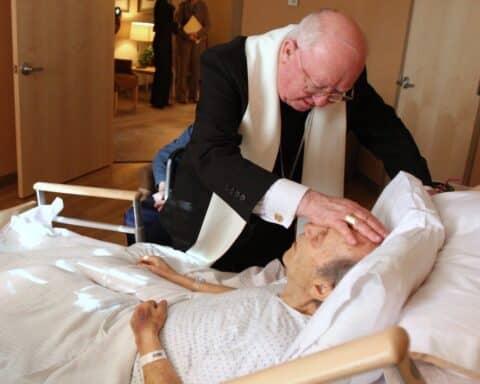Switzerland, known for its natural beauty, its chocolate, its watches and its efficiency, is regarded as a leader in another, less wholesome respect: its high number of assisted suicides. Assisted suicide has been legal in the country since the mid-1940s, and the numbers are only growing stronger and steadier as the public stigma around assisted suicide, unfortunately, is lessening.
In response to this growing problem within their country, the bishops of Switzerland released a lengthy document at the beginning of December, in which they addressed pastoral practices regarding assisted suicide. Within its pages, they reminded the faithful that assisted suicide “is radically against the Gospel message” and that its practice “is a serious attack on the preservation of the life of the human person that must be protected from conception until natural death.”
In recounting each step of the dying process approved in the country, the bishops relayed that after taking the lethal substance, death occurs an average of 25 minutes later, though it can take as long as 18 hours. As a result, they wrote, “There arises a difficult question regarding accompaniment during these long minutes of agony: Can we leave a person to their loneliness during this time?”
While the bishops wrote that priests should accompany as much as possible those who have decided to commit suicide, they adamantly concluded that they must leave the room once the lethal drug is given to the patient. There are three reasons why this is important and not considered “abandonment,” they wrote. First, the Church is always in favor of life; second, the presence of a pastoral worker at the bedside of one who is committing suicide deliberately could be seen as the priest offering “assistance or cooperation” in the event on behalf of the Church; and, finally, because witnessing a patient commit suicide can be psychologically traumatizing.
The guidelines of the Swiss bishops, however, seem at odds with the position of Archbishop Vincenzo Paglia, president of the Pontifical Academy for Life. During a press conference ahead of a two-day symposium on palliative care, Archbishop Paglia said he would be willing to hold the hand of someone who had chosen to die by the means of assisted suicide. “The Lord never abandons anyone,” he said. “In this sense, to accompany, to hold the hand of someone who is dying is, I think, a great duty every believer should promote.”
These differing opinions and instructions by Church leaders contribute to the greater conversation around the question: “What does it mean to accompany someone?”
Accompaniment has been a favorite word of this pontificate, so much so that Pope Francis included an entire section in Evangelii Gaudium, his 2013 apostolic exhortation, on the topic. And it is to this document that we look for clarity.
“In our world, ordained ministers and other pastoral workers can make present the fragrance of Christ’s closeness and his personal gaze,” Pope Francis wrote. “The Church will have to initiate everyone — priests, religious and laity — into this ‘art of accompaniment’ which teaches us to remove our sandals before the sacred ground of the other (cf. Ex 3:5). The pace of this accompaniment must be steady and reassuring, reflecting our closeness and our compassionate gaze which also heals, liberates and encourages growth in the Christian life” (No. 169).
Then he adds this important paragraph: “Although it sounds obvious, spiritual accompaniment must lead others ever closer to God, in whom we attain true freedom,” Pope Francis wrote. “Some people think they are free if they can avoid God; they fail to see that they remain existentially orphaned, helpless, homeless. They cease being pilgrims and become drifters, flitting around themselves and never getting anywhere. To accompany them would be counterproductive if it became a sort of therapy supporting their self-absorption and ceased to be a pilgrimage with Christ to the Father” (No. 170).
When someone chooses to commit suicide, assisted or not, he or she performs an act that “is contrary to love for the living God,” the Catechism teaches — and therefore contrary to his or her pilgrimage to Christ. Because of this, it is impossible to offer true spiritual accompaniment to those who are actively engaged in the act of suicide. And while this might seem, from the outside, to be abandonment, for the Christian who is trying to “lead others ever closer to God,” it really is an act of love.
Our Sunday Visitor Editorial Board: Gretchen R. Crowe, Scott P. Richert, Scott Warden, York Young





